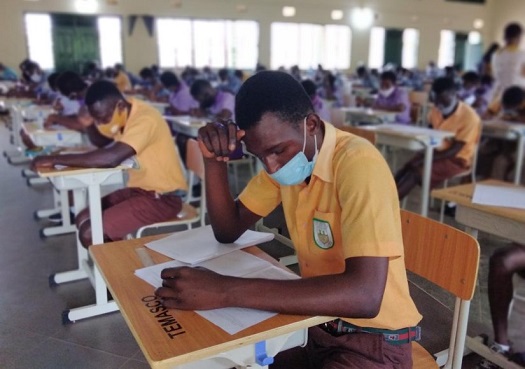All is set for the West African Examinations Council (WAEC) to conduct this year's Basic Education Certificate Examination (BECE), beginning Monday, July 8.
The government has released GH¢55.9 million to WAEC for the conduct of the examination.
In all, 570,461 candidates from basic schools and private candidates will sit for the examination.
In terms of the school candidates, 569,095 pupils, made up of 282,648 males and 386,447 females will sit for the examination.
In respect of the BECE for private candidates, 1,366 candidates, comprising 735 males and 631 females registered for the examination.
The Head of Public Affairs at WAEC, John K. Kapi, who made this known at a media briefing in Accra yesterday, said the candidates were from 19,506 schools and would take the examination at 2,123 centres across the country.
He said the examination would begin with English Language on Monday, July 8, and end with Arabic on Monday, July 15.
Mr Kapi added that 2,123 supervisors, 1,889 assistant supervisors and 19,973 invigilators had been engaged to ensure a seamless conduct of the examination.
School candidates will be examined based on the newly introduced Common Core Curriculum, while private candidates will be examined on the old syllabus," he added.
Preparations
Touching on the preparations the council had made for the successful conduct of the examination, Mr Kapi said a sensitisation programme on the rules and regulations had been organised for all candidates and other stakeholders across the country.
Again, he said WAEC had inspected all depots for the storage of confidential materials to ensure that they met security requirements.
"We have also done distribution of examination stationery items such as objective answer cards, answer booklets, pencils to the district education offices throughout the country," the Head of Public Affairs at WAEC stated.
Mr Kapi also said adjustments had been made to ensure that the examination was more accessible to candidates who had special educational needs.
For instance, provision had been made for braille papers for visually impaired candidates, while large print papers had been made for those with low vision, he indicated.
Again, provision had been made for an additional time of one and a half times the time allotted to other candidates for hearing-impaired candidates as well as those with cerebral palsy and autism spectrum disorders.
Caution
Mr Kapi cautioned stakeholders, including students, parents, teachers, invigilators and supervisors, to strictly adhere to the rules and regulations for the conduct of the examination.
He stressed that while parents must ensure that their children did not send mobile phones to the examination centres, invigilators, teachers and supervisors needed to be sure that they did not create any room for cheating and other malfeasance.
"Proprietors of schools, parents, head teachers, teachers and all other persons not involved in the conduct of the examination are not allowed at the centres," he said.
Irregularities
Mr Kapi said WAEC had noted with concern a number of cases where candidates wrote telephone numbers or the phrases "help me", "just call my mom" in the answer booklets while others inserted various sums of money in their answer booklets, soliciting for help from examiners.
"We wish to state clearly that this is classified as seeking external assistance and is a punishable offence," he stressed.
He said the staff of WAEC, the Ghana Education Service (GES), the Ghana National Association of Teachers (GNAT), the Ghana Police Service, National Security, National Intelligence Bureau (NIB) and external monitoring agents recruited by the council would be monitoring the examination.
“These personnel would carry identification cards on them, and we urge supervisors to request for these cards if they are suspicious of any persons purporting to be monitors,” he stressed.
While courting the support of all stakeholders to preserve the sanctity of the examination, Mr Kapi said WAEC would go all out to clamp down on perpetrators of examination irregularities.
He urged the candidates to be wary of the activities of rogue website operators whose primary aim was to circulate fake questions and lure them into subscribing to those questions.





